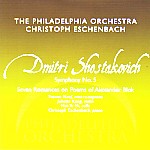Christoph Eschenbach usually does pain and angst particularly well, so you would think that Shostakovich would be right up his alley. Not so. Yes, he plays the Largo very beautifully, with the superb Philadelphia strings coming into their own. The coda of the finale also sounds terrific. Eschenbach predictably opts for the slow and agonizing approach, and this is precisely the problem. The whole symphony gets played that way, slow and not so much agonizing as simply dreary. Of course the Philadelphia Orchestra can play this music in its sleep, but we really didn’t need proof. The first-movement exposition never has been given such a uniformly grey and undifferentiated color. The start of the development section, with its pounding piano and low brass, barely registers. The scherzo lacks the least shred of mordant humor, and Eschenbach’s tacky ritards and distortions of the melodic line only emphasize his basic stiffness of approach.
Sonically, this is all wrong: soft and ill-focused, particularly when it comes to the cellos and basses who play such a critical role in the first two movements. Balances are odd: at the climax of the first movement, the xylophone sticks out more than the cymbals. While the Blok songs are well performed and affectingly sung by Yvonne Naef, I question the utility of these orchestra/chamber couplings (Eschenbach’s Philadelphia Tchaikovsky recordings also have them). The main attraction here is (or ought to be) the orchestra. I love these songs, but I would never play them after (or before) the symphony, and you can find any number of excellent performances unshackled to a dead interpretation of the Fifth. Philadelphia has made very good recordings of this symphony at least three times previously, twice under Ormandy (Sony and RCA), and once under Muti (EMI). We certainly did not need another, particularly one this dull.
































